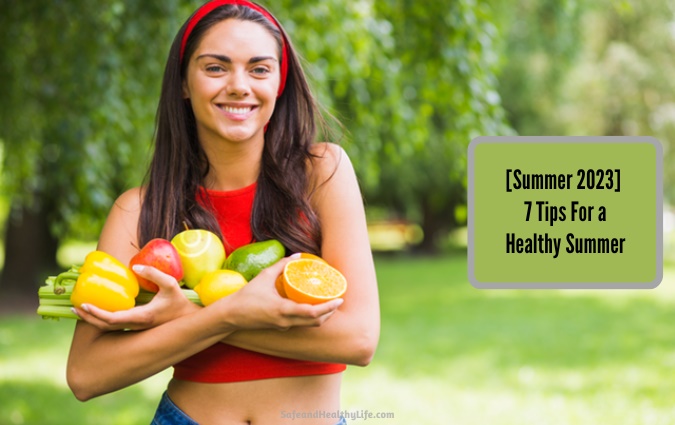
Safety tips for this summer’s hot days are a must. During that period the high temperatures can cause fatigue and discomfort, as well as raise the risk of several health problems such as skin inflammation, fever, lack of hydration, and food poisoning.
To prevent these issues and maintain good health, it is crucial to adopt suitable precautions.
Following simple guidelines for your safety is preferable, as well as relying on treatments that can considerably enhance your general health and well-being.
1. Food safety
Food tends to spoil quickly in the hot summer weather, so it is crucial to be mindful of where and what you are eating.
It is vital to ensure that the food is freshly prepared and stored correctly to prevent contamination. Proper refrigeration can be an excellent initial step in this regard.
Some of the steps that must be taken to keep food safety are:
- To avoid the spread of harmful bacteria, it is important to clean hands, utensils, containers, and work surfaces before handling food.
- To minimize the growth of bacteria, cook food on the same day it will be used instead of preparing it in advance.
- Fruits and vegetables should be washed before being sliced in case bacteria are present on the peel or skin.
- Mayonnaise-based dishes and other cold foods should be stored in a well-insulated cooler with ample ice or frozen gel packs.
- Discard any leftover food that has been unrefrigerated for more than two hours, or if the temperature is above 90°F, discard it after one hour.
It is essential to follow these measures to prevent food poisoning, which can be life-threatening and require hospitalization. Apart from the physical harm it can cause, hospitalization stays can be expensive and put a dent in your finances.
However, if you live in Switzerland and have health insurance, there may be supplementary plans available that cover all medical expenses, so you need not worry.
2. Stay hydrated and get plenty of rest
Dehydration is an ongoing problem during the summer due to increased sweating and perspiration. It is essential to consume plenty of water throughout the day, as well as fresh fruit drinks, lemonade, and buttermilk, to avoid this problem and keep your body hydrated.
Alcohol, fizzy drinks, and caffeine should all be consumed in moderation because they dehydrate the body. Dehydration harms regular physiological processes and diminishes the immune system. Signs showing that you are dehydrated are headaches, nausea, dry skin, and higher body temperature.
During the summer, water is the supreme remedy and needs to be consumed in large amounts. During the hot summer months, it is advised that people drink between 2-3 liters of water every day.
3. Seasonal fruits and vegetables
Eating fresh and affordable products during its peak season is not only tasty but also beneficial for your health and immune system. Consider checking out your nearby farmer’s market or go fruit-picking to get the best deals.
Here are some excellent options to consider during hot summer days: Watermelon, corn on the cob, cucumbers, tomatoes, berries, peaches, plums, cherries, nectarines, and figs.
4. Keep active
People have a fantastic chance to increase their physical exercise and improve their general fitness during the summer.
People have more free time to participate in pursuits that can enhance their health thanks to longer days and summer vacations.
It is advised to take advantage of the milder temperature in the early morning or late afternoon when doing outdoor activities like walking, hiking, going to zoos or other outdoor leisure areas, discovering nature sanctuaries or parks, bicycling, jogging, or swimming are some of the outdoor things that people can do to increase their physical exercise during the summer.
Regular physical exercise may prevent obesity, promote fitness, and boost mental health.
5. Protect your skin(sunscreen repellent)
Sunlight is a good source of vitamin D, which is essential for maintaining good health. However, excessive exposure to UV light from the sun can be dangerous and increase the risk of skin damage and cancer.
The two forms of sunlight in the atmosphere are UVA and UVB. UVA rays can penetrate deep into the skin and damage connective tissues and blood vessels, leading to premature aging and loss of elasticity. On the other hand, UVB rays cause immediate skin damage and redness, resulting in sunburn.
Overexposure to UVA rays can cause various skin cancers, and those at higher risk should use sunscreen with a higher SPF.
Additionally, individuals should reapply sunscreen after swimming or sweating and consider wearing protective clothing or staying in the shade to minimize the risk of sunburn.
6. Keep Cool in Extreme Heat
In hot weather conditions, a person may experience heat exhaustion, which can result in several symptoms such as cool, moist skin with goosebumps, heavy sweating, faintness, dizziness, nausea, headache, fatigue, weak, rapid pulse, and low blood pressure upon standing, and muscle cramps.
It is essential to immediately stop and rest, find a cool shelter away from the sun, and drink an adequate amount of water or sports drinks to alleviate the symptoms of heat exhaustion.
To decrease the chances of experiencing heat exhaustion, one should consider the following measures:
- Quit consuming heavy meals
- Opt for lightweight clothing
- Stay away from direct exposure to sunlight
- Make use of air conditioning
- Ensure adequate hydration by consuming considerable amounts of water.
7. Protection against bugs and insects
Each year, a significant number of individuals require hospitalization due to insect bites. Those who frequently spend time outside, particularly in warmer regions, may use insect repellents containing DEET which is a chemical compound that hides the scent of humans, thereby preventing biting insects from approaching.
The following tips to prevent insect stings:
- Dispose of garbage frequently.
- Wear closed-toe shoes at all times.
- Don’t use excessive fragrances.
- Ensure windows and doors are kept closed.
- Avoid wearing dark-colored or floral print clothing that may attract wasps.
Overall, there are several key tips to remember for staying healthy during the summer season. These include staying hydrated by drinking plenty of water, protecting the skin from harmful UV rays with sunscreen and protective clothing, avoiding prolonged exposure to high temperatures, and taking steps to prevent insect bites and stings.
By following these guidelines, individuals can enjoy all that summer has to offer while also maintaining their overall health and well-being.
About The Author:
Stacey Smith is a freelance health writer. She is passionate to write about women’s health, dental health, diabetes, endocrinology, and nutrition and provides in-depth features on the latest in health news for medical clinics and health magazines.




